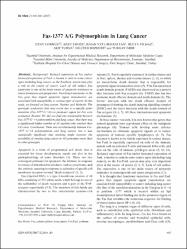Fas-1377 A/G polymorphism in lung cancer

View/
Access
info:eu-repo/semantics/openAccessDate
2007Author
Görmüş, UzayErgen, Arzu
Yaylım-Eraltan, İlhan
Yılmaz, Hülya
Turna, Akif
Bozkurt, Nilüfer
İsbir, Turgay
Metadata
Show full item recordCitation
Gormus U, Ergen A, Yaylim-Eraltan I, Yilmaz H, Turna A, Bozkurt N, Isbir T. Fas-1377 A/G polymorphism in lung cancer. In Vivo. 2007; 21(4): 663-666.Abstract
Background: Reduced expression of Fas and/or
increased expression of FasL is known to exist in some cancer
types including lung cancer, so the Fas/FasL system may play
a role in the course of cancer. Lack of cell surface Fas
expression is one of the main routes of apoptotic resistance in
tumor formation and progression. Functional mutations in the
Fas gene that impair apoptotic signal transduction are
associated with susceptibility to various types of cancer. In this
study, we focused on lung cancer. Patients and Methods: The
genotypic tendencies that may occur due to a specific point
mutation (Fas-1377 G→A) on promoter region for Fas were
evaluated. Results: We did not find any relationship between
Fas-1377 G→A polymorphism and lung cancer. But there was
a significantly higher number of AG patients who smoked than
GG ones. Conclusion: There was no relationship between Fas-
1377 G→A polymorphism and lung cancer, but it was
statistically significant that smoking might increase the
possibility of creating lung cancer in AG genotypes more than
in other genotypes.

















